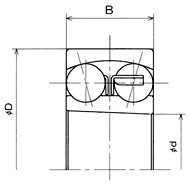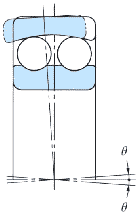 |
- Self-aligning Ball Bearings are particularly suitable for applications where misalignment occurs from errors in mounting or from shaft deflection.
- This bearing should only be used in light axial load applications due to the small axial capacity. For applications where the bearing load (particularly axial load) carrying capacity is insufficient, spherical roller bearings, which have the same self-aligning property, should be used instead.
- Bearings are fitted with pressed steel cage or polyamide cage. The suffix G of bearing number on the packing surface indicate polyamide cage.
|



